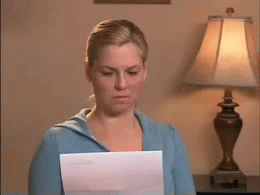#RealDeal: I’m autistic with hyperlexia, synesthesia, and I’m dyslexic (here’s what that means)
It’s so surreal not knowing that all of this wasn’t “normal.”
Hence why I’ve taken time to fully adjust, because it all feels truly Earth shattering.
How am I JUST figuring out that I’m dyslexic?!?! I also had hyperlexia as a kid, so again, fell through the cracks – but wow.
When I was growing up, autism testing was only developed for boys, and boys and girls show autism differently.
I spent 37 years believing I was neurotypical, even though I’m VERY obviously neurodivergent.
Since there’s a lot of info about autism available, let me explain some of her lesser known “cousins,” hyperlexia, synesthesia, and dyslexia.
What is hyperlexia?
Hyperlexia is a neurodevelopmental condition characterized by an intense fascination with letters or numbers, an early ability to read, and difficulties with language and social interaction. Individuals with hyperlexia typically show exceptional reading skills, often reading at a very young age (before the age of five) and with a high level of accuracy, but they may have difficulties with understanding and using language in context, as well as with social skills.
Hyperlexia is considered a rare condition, and its exact prevalence is not known. It is often associated with autism spectrum disorder (ASD), and many individuals with hyperlexia also have ASD. However, hyperlexia can also occur independently of ASD.
There is no specific cure for hyperlexia, but various therapies and interventions can help individuals with hyperlexia develop their language and social skills. These may include speech therapy, occupational therapy, social skills training, and other forms of behavioral therapy.
What was it like growing up with hyperlexia?
I was OBSESSED with letters and shapes.
So much so, that I would take my Pound Puppy books and sit at the computer (which I had access to thankfully) and would do (what I would call) “matching shapes.” I taught myself to type at age 2, but only six months after I started talking like a 4 year old (at 18 months for those who need help with the math).
I was very advanced in reading, but I couldn’t always comprehend it. This led to a lot of confusion in school because I had to work twice as hard to read and re-read what I had just read because it wasn’t “sinking in.”
Of course, I then discovered (also as an adult) I have ADHD and could read but only if I’m interested in what I’m reading.
How are ADHD and dyslexia related?
ADHD and dyslexia are two distinct conditions that can impact a person’s ability to learn and function in various areas, including reading and writing. While ADHD is a neurodevelopmental disorder characterized by hyperactivity, impulsivity, and difficulties with attention and focus, dyslexia is a learning disability that primarily affects reading and language skills.
Research has shown that there is a high degree of comorbidity between ADHD and dyslexia, meaning that individuals with one condition are more likely to have the other. In fact, estimates suggest that up to 50% of individuals with ADHD also have dyslexia.
When ADHD and dyslexia co-occur, the impact on reading and writing can be particularly challenging. Individuals may struggle with attention and focus when reading, which can lead to difficulties with comprehension and retention of information. They may also struggle with processing speed, making it more difficult to keep up with the demands of reading and writing tasks.
It can be challenging, but not if you also know about … synesthesia!
Synesthesia is the reason why I finished high school at 16 with honors.
When I write, I hear notes. So while dyslexia and hyperlexia had their advantages and limitations, synesthesia is like the glue that made it all work.
(Strictly in terms of reading and writing – synesthesia too has its own challenges.)
While I might not “see with my eyes” what the letters are, I do hear notes when I write so it makes it all “work together.”
I don’t *think* I hear notes when I’m reading (still auditing), but I do hear the notes when I’m reading my own writing.
Thanks to synesthesia, I have a hyper hyper connectivity in my brain that (when balanced) allows me to lead an INCREDIBLY creative, energetic, and intelligent existence. I figure things out very quickly, and have proven this to myself consistently (which has really helped my self esteem).
What is synesthesia?
Synesthesia is a neurological condition in which stimulation of one sensory or cognitive pathway leads to automatic, involuntary experiences in another pathway. For example, someone with synesthesia may perceive letters or numbers as having specific colors, or they may perceive music as having specific shapes or textures.
In terms of reading and writing, synesthesia can sometimes enhance these activities by providing additional sensory experiences that can help with memory and comprehension. For example, a person with grapheme-color synesthesia may be able to remember words more easily because they associate each letter with a specific color.
However, synesthesia can also sometimes interfere with reading and writing, particularly if the synesthetic experiences are overwhelming or distracting. For example, a person with sound-color synesthesia may find it difficult to concentrate on written text if they are distracted by the colors associated with the words.
Additionally, some individuals with synesthesia may find it challenging to communicate their experiences to others, particularly if their experiences are different from what is considered “normal.” This can make reading and writing challenging, as they may struggle to find the right words to describe their experiences.
Overall, the impact of synesthesia on reading and writing can vary greatly depending on the individual and their specific experiences. In some cases, it may enhance these activities, while in other cases, it may pose challenges.
Not being diagnosed with any of these conditions led to constant frustration, sensory overload, this overwhelming feeling of “why can’t I be normal?”
What helps me be balanced with all of the conditions mentioned above are sensory glasses (orange ones work best for me), noise cancelling headphones (they help me balance the tones I hear from people and my environment at any given moment), a dark space for 20 mins, and a dog.
Literally, that simple and I can balance all of the hyper-connectivity and BEAUTIFUL creativity that is the blessing/ superpower of them all.
All of this is a gift that once you know allows you to be more present, and TRULY live your best life.
I’ve never been happier, I’ve never been healthier, and that’s something I spent a LOT of money trying to figure out.
It. Does. Get. Easier.
Shoot me a DM if you need some help or just want to ask questions.
I’m always here … unless, of course, I’m having my sensory reset day and then I don’t talk to anyone … unless you’re my dog.



